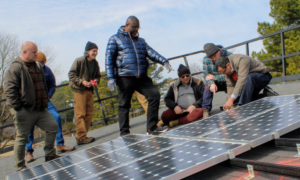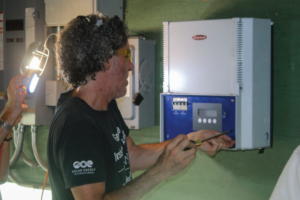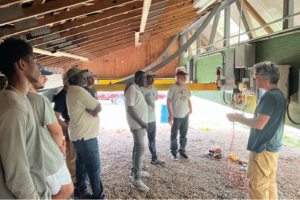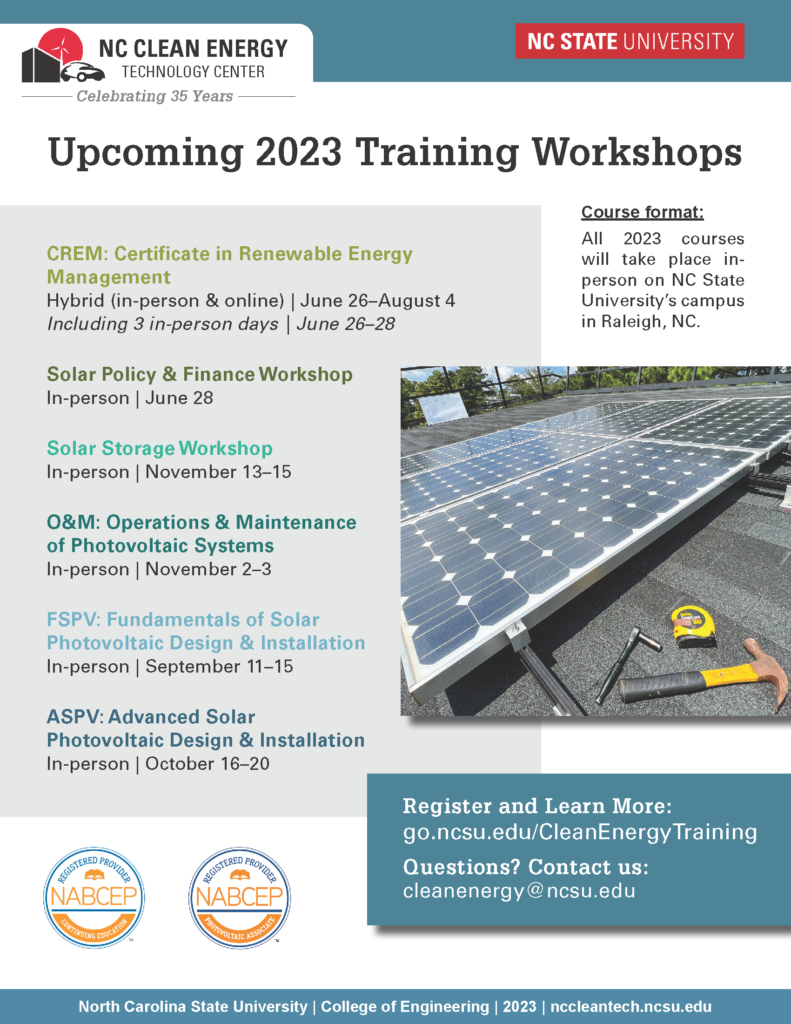35 Years of NCCETC: Training Program Courses Teach Tomorrow’s Clean Energy Workforce
 The North Carolina Clean Energy Technology (NCCETC) at NC State University is celebrating its 35th Anniversary in 2023. Since its formation, the Center has concentrated a large portion of its resources to train professionals and to provide educational opportunities for decision-makers and the public to learn about solar energy and other renewable energy technologies.
The North Carolina Clean Energy Technology (NCCETC) at NC State University is celebrating its 35th Anniversary in 2023. Since its formation, the Center has concentrated a large portion of its resources to train professionals and to provide educational opportunities for decision-makers and the public to learn about solar energy and other renewable energy technologies.
 The Training Program at NCCETC seeks to help individuals get the training and credentials they need to launch their clean energy careers and support professionals seeking to integrate clean energy into their day-to-day work. Achieving a sustainable energy economy can only be built from an engaged, highly-skilled workforce across the board – even in industries that may not seem to be related to clean energy at all.
The Training Program at NCCETC seeks to help individuals get the training and credentials they need to launch their clean energy careers and support professionals seeking to integrate clean energy into their day-to-day work. Achieving a sustainable energy economy can only be built from an engaged, highly-skilled workforce across the board – even in industries that may not seem to be related to clean energy at all.
The N.C. HealthyBuilt Homes Program (HBH), a statewide green-building program launched in March 2004, was a collaboration of the NCCETC, the State Energy Office, North Carolina Department of Administration, NC HealthyBuilt Homes community partners and local professional building organizations. The program supported small and medium-size homebuilders with technical and marketing assistance, design reviews, workshops, presentations and field-consultation services that teach green-building practices.
Also in 2004, NCCETC became the only training provider in North Carolina to have been awarded as an Interstate Renewable Energy Council (IREC) Institute of Power Quality (ISPQ) Accredited Training Program Provider. After an intensive 18-month process including an extensive site assessment, the Center’s thermal and PV courses were awarded as IREC ISPQ Training Programs – the highest international accreditation standard for renewable energy training programs.
 Lyra Rakusin first joined NCCETC in 2004 when it was known as the NC Solar Center. Rakusin previously served as a Senior Specialist where she helped direct training workshops and other workforce development events. She was tasked with developing the Renewable Energy Technologies Diploma Series (RETDS).
Lyra Rakusin first joined NCCETC in 2004 when it was known as the NC Solar Center. Rakusin previously served as a Senior Specialist where she helped direct training workshops and other workforce development events. She was tasked with developing the Renewable Energy Technologies Diploma Series (RETDS).
The Series provides technical and hands-on training, information on current policies and technologies, and a support network of experienced renewable energy professionals. “The diploma series had a lot of really great companies and entrepreneurs that came out of it,” said Rakusin. “Erik Lensch took one of the earliest actuations of the diploma series and he launched Argand Energy Solutions soon after taking our program.” Argand grew into one of the larger commercial installation and project development companies in the Carolinas. In 2014, the company completed a successful sale to York Capital, a large hedge fund. Branded under the name Entropy Solar Integrators, the company went on to build over 350 MegaWatts (MW) of solar projects.
 In late 2016, Lensch founded Leyline Renewable Energy to finance the development of solar and biogas projects across the United States. More recently, Lensch partnered with NCCETC as a speaker for the keynote plenary “The Relationship of Environmental, Social and Governance (ESG) to Clean Energy Today” at the 2022 State Energy Conference of North Carolina.
In late 2016, Lensch founded Leyline Renewable Energy to finance the development of solar and biogas projects across the United States. More recently, Lensch partnered with NCCETC as a speaker for the keynote plenary “The Relationship of Environmental, Social and Governance (ESG) to Clean Energy Today” at the 2022 State Energy Conference of North Carolina.
During the plenary, Lensch described how Leyline Renewable uses diversity, equity and inclusion to guide their investments both internally and externally. “We’re being proactive in how we’re investing capital by, for example, looking for projects that support low-income housing communities, or that can support developers run by minority or women-owned companies,” said Lensch.
 Courses offered by NCCETC are taught and curated by highly-skilled industry experts, drawing on years of past experience to help students understand real-world applications of classroom instruction. David Del Vecchio, a solar instructor at NCCETC, uses his 23 years of experience to help him communicate technical subjects in a way that students from any background can comprehend.
Courses offered by NCCETC are taught and curated by highly-skilled industry experts, drawing on years of past experience to help students understand real-world applications of classroom instruction. David Del Vecchio, a solar instructor at NCCETC, uses his 23 years of experience to help him communicate technical subjects in a way that students from any background can comprehend.
Del Vecchio became certified as a PV professional in 2005 by the North American Board of Certified Energy Practitioners (NABCEP) and joined NCCETC as a training instructor a year later. In 2010, he also became a certified Master PV Trainer and Instructor through the International Renewable Energy Council.
 When Del Vecchio began teaching 14 years ago, his primary motivation was to ensure quality and robust installations utilizing industry best practices, code compliance and safety for technicians working with solar technology. In every course he teaches, Del Vecchio aims to set an example for his students to strive for the best to ensure the safety and quality of PV installations across the industry.
When Del Vecchio began teaching 14 years ago, his primary motivation was to ensure quality and robust installations utilizing industry best practices, code compliance and safety for technicians working with solar technology. In every course he teaches, Del Vecchio aims to set an example for his students to strive for the best to ensure the safety and quality of PV installations across the industry.
Rakusin recalled that the comprehensive training provided in classes offered by NCCETC is exactly what drew the attention of John Donoghue, President of Cape Fear Solar Systems. Since Donoghue completed his training, he has sent several of his own employees to complete the fundamentals of solar PV design and installation course hosted by NCCETC.
“With the hustle and bustle of day to day life, these courses provide an intensive way to get exposure to information, helping our people better understand the overall concepts of solar designs and installations,” said Donoghue.
Certificate in Renewable Energy Management (CREM) Summer Session Starts June 26
 The Certificate in Renewable Energy Management (CREM) program is for those interested in learning about renewable energy project management and gaining what it takes to make a renewable energy project feasible, profitable and marketable. You can register now for the next CREM session of 2023 taking place from June 26 through August 4, 2023.
The Certificate in Renewable Energy Management (CREM) program is for those interested in learning about renewable energy project management and gaining what it takes to make a renewable energy project feasible, profitable and marketable. You can register now for the next CREM session of 2023 taking place from June 26 through August 4, 2023.
All NCCETC newsletter subscribers and your colleagues are invited to attend the next CREM course to build skills related to the development of renewable energy projects. Use or share the discount code – CREM10 – when you register for a 10% discount!
 The CREM program covers renewable energy technology applications, solar business fundamentals, policies that are shaping a rapidly changing industry, and strategies to finance and manage a renewable project. CREM not only provides participants with a sound foundation of how existing renewable energy technologies work and solar fundamentals, but also provides a firm grasp of policies that create the market to better help you select that perfect project site.
The CREM program covers renewable energy technology applications, solar business fundamentals, policies that are shaping a rapidly changing industry, and strategies to finance and manage a renewable project. CREM not only provides participants with a sound foundation of how existing renewable energy technologies work and solar fundamentals, but also provides a firm grasp of policies that create the market to better help you select that perfect project site.
“CREM guides the participants on how to navigate the current financial landscape so they can make informed decisions as a manager and businessperson in the renewable energy industry,” explained Allison Carr, Training Program Manager at NCCETC.
The 40-hour CREM program starts with an intensive 3-day module that takes place on-site at NC State University in Raleigh, NC. Following the 3-day in-person instruction, students will participate in live webinars and self-paced weekly webinars and assignments completed virtually over the course of 6 weeks. Participants are required to submit a final project to successfully complete the program.
Upcoming Training Courses on the Calendar
 NCCETC offers both online and in-person educational workshops covering the technical and financial side of clean energy through its NABCEP registered Training Program. The program is a logical extension of NCCETC’s expertise in the clean energy industry and is designed to help individuals get the training and credentials they need to launch their careers or support professionals seeking to integrate clean energy into their work.
NCCETC offers both online and in-person educational workshops covering the technical and financial side of clean energy through its NABCEP registered Training Program. The program is a logical extension of NCCETC’s expertise in the clean energy industry and is designed to help individuals get the training and credentials they need to launch their careers or support professionals seeking to integrate clean energy into their work.
If you’re interested in renewable energy and want to strengthen your skills, see our training calendar online or sign up for the weekly newsletter to always be in the know about upcoming courses and ways to save on registration!
This article is part of a series highlighting the work done by the NC Clean Energy Technology Center throughout its history in celebration of its 35th Anniversary. View the previous article to learn why the Database of State Incentives for Renewables and Efficiency (DSIRE) is recognized as the most comprehensive source of information on clean energy related policies and incentives in the United States.